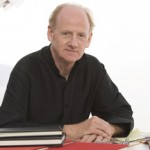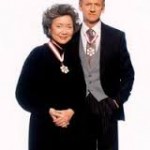I’ve come back for a second assault of John Ralston Saul’s 1995 book The Unconscious Civilization.1 It’s a brainy thing, but not awfully long. And it’s not that it was such tough going; Saul’s prose is quite readable even on difficult subjects. I just wasn’t bringing my mind to it, and there are always Other

JRS in book-signing mode. Best advice I’ve ever heard on writing a book: “Finish it so you can go write a better one!” I remain heedless.
Things to Read. Saul made his early reputation as a novelist, but that phase of his career has been eclipsed by his recent prolific output of essays and book-length arguments on globalization, citizenship, the true nature of democracy and of his Canadian homeland. He is something of a gadfly, and sometimes the epithet “philosopher-king of Canada” is muttered irritably, usually by fellow Canucks suspicious of both thinkers and those who dare to do it in public.
I find him a witty, scarily smart and superbly opinionated voice. In the mid-oughts, when I was writing for the Governor General of Canada, Adrienne Clarkson, I got to spend some time in various front-row seats for the JRS experience. He’s a passionate speaker whose fire is modulated by a laconic demeanour – he almost sounds careless, diffident, off-handed in his commentary, unless you’re listening to what he’s actually saying – and by his easy eloquence in French and English. He wore out his co-workers and assistants, as his mind never stops. (I used to wonder how he slept, how he turned that thing off.) He’s a restless and brave dude, and though he’s a wine connoisseur and an unabashed intellectual, he’s not stuffy at all. Though a very shaky skater, at nearly 60 he wasn’t afraid to join young staffers in a bit of pick-up hockey on Rideau Hall’s outdoor rink.
My guess is that he still composes his speeches and books with a left-handed scrawl on legal pads, and he’s fast. My favourite story of JRS as a public speaker has him in the back seat of a car delivering him to a large gathering, likely on citizenship and the public good, in his function as the vice-regal spouse. Upon arrival, he looked up from his rapid scribbling and said to the driver, “Once more around the block, please, and that’ll do it.” It’s a telling anecdote, and it might even be true.
The Unconscious Civilization lectures, though, and then the book that followed them, were not back-seat compositions. They were written in the time just after his best-selling philosophical works Voltaire’s Bastards and The Doubter’s Companion, and before Reflections of a Siamese Twin and The Collapse of Globalization and his six years of living at Rideau Hall, Canada’s “Government House”. The Unconscious Civilization is a fine short introduction to his thinking. He writes about the achievement of the greatest common good, and the social forces that oppose the expression of our full
citizenship, the true flowering of a democracy that he sees as only marginally present, given little more than lip service, in our modern Western nations. As the title suggests, he does want to wake us up, and his warnings still ring strongly nearly 20 years after he first made them.
In subsequent posts, I’ll give a quick précis of each of the five lectures/chapters that made The Unconscious Civilization a book that I’m glad to be giving a second chance.
1 What later became a book was originally delivered as the 1995 Massey Lectures, Canada’s most esteemed annual series of public talks. They were named after the first Canadian Governor-General to actually be Canadian. Mr. Saul later served several years as a kind of vice-regal “first man”, living at Rideau Hall with his wife Adrienne Clarkson, the GG from 1999-2005.


James, I enjoy your writing, but in no way feel inclined to read Mr. Saul’s elucidations.
Well, that was clear! Admiration for Mr. Saul is not universal, even (especially?) among former Rideau Hall staffers.